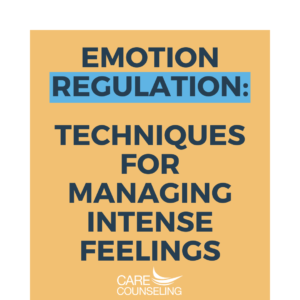Emotion Regulation: Techniques for Managing Intense Feelings
 Emotions are an integral part of the human experience, enriching our lives with joy, love, excitement, and compassion. However, at times, intense or overwhelming emotions can be challenging to navigate. In this blog post, we will explore various strategies for managing intense feelings and promoting emotional balance.
Emotions are an integral part of the human experience, enriching our lives with joy, love, excitement, and compassion. However, at times, intense or overwhelming emotions can be challenging to navigate. In this blog post, we will explore various strategies for managing intense feelings and promoting emotional balance.
Understanding Emotion Regulation
Emotion regulation is the process of recognizing, understanding, and effectively managing emotions. It involves developing the ability to modulate emotional responses, so they are appropriate to the situation and do not interfere with daily life.
Common Emotion Regulation Challenges
Before we delve into techniques, it’s essential to recognize common emotion regulation challenges:
- Emotional Suppression: Suppressing emotions without addressing them can lead to long-term stress and emotional difficulties.
- Rumination: Overthinking or dwelling on negative emotions can intensify them and prolong their impact.
- Avoidance: Avoiding situations that trigger intense emotions can limit personal growth and opportunities for learning.
- Lack of Awareness: Failing to recognize and label emotions can make it challenging to regulate them effectively.
Emotion Regulation Techniques
- Mindfulness Meditation:
Mindfulness meditation involves focusing your attention on the present moment without judgment. Regular practice can increase emotional awareness and provide a buffer against intense feelings. It allows you to observe emotions as they arise, reducing reactivity.
- Deep Breathing:
Deep, diaphragmatic breathing can calm the body’s stress response. When you feel intense emotions, pause and take slow, deep breaths. This technique activates the body’s relaxation response and can help you regain control.
- Cognitive Restructuring:
Cognitive restructuring involves identifying and challenging irrational or unhelpful thoughts that contribute to intense emotions. By reframing your thoughts, you can change your emotional response to a situation.
- Journaling:
Writing about your emotions and experiences in a journal can be therapeutic. It allows you to express your feelings, gain insight into patterns, and find healthy outlets for processing intense emotions.
- Progressive Muscle Relaxation:
Progressive muscle relaxation involves tensing and then releasing different muscle groups to reduce physical tension associated with intense emotions. This technique promotes relaxation and reduces stress.
- Self-Compassion:
Practicing self-compassion involves treating yourself with the same kindness and understanding that you would offer to a friend. Being gentle with yourself during difficult moments can help soothe intense feelings.
- Seeking Social Support:
Sharing your emotions with trusted friends, family members, or a therapist can provide emotional validation and perspective. Social support is a vital resource for managing intense feelings.
- Time-Outs:
When emotions become overwhelming, it’s okay to take a time-out. Step away from the situation, engage in a calming activity, and return when you feel more composed.
- Positive Distraction:
Engaging in enjoyable activities or hobbies can provide a temporary escape from intense emotions. It can be a healthy way to shift your focus and regulate your mood.
- Emotion Acceptance:
Rather than trying to suppress or avoid intense feelings, practice accepting them as a natural part of the human experience. This acceptance can reduce emotional resistance and distress.
Emotion regulation is a valuable skill that enhances emotional well-being, resilience, and overall quality of life. While managing intense feelings can be challenging, the techniques mentioned above can provide practical tools to navigate them effectively. Remember that it’s okay to seek professional help when emotions feel unmanageable or persistent.



























